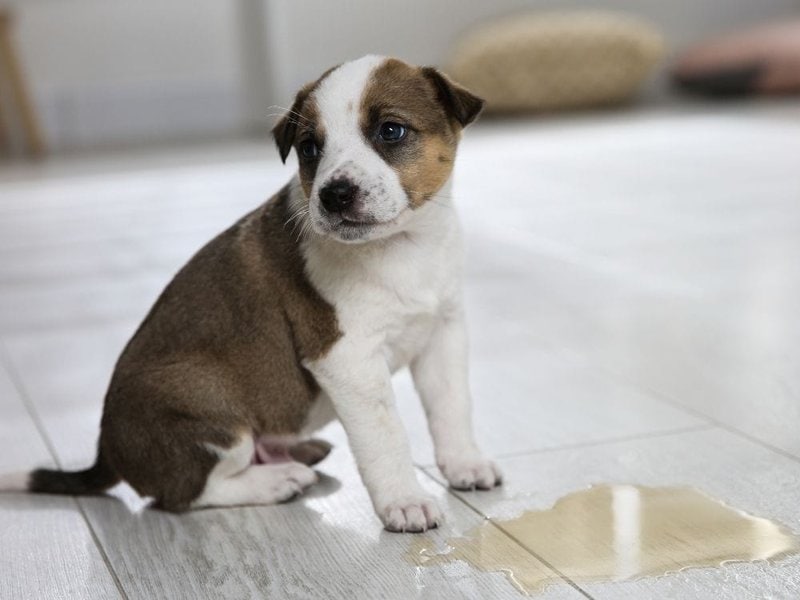Having to regularly deal with your doggie’s pee accidents at home can be a frustrating experience and one that has led many dog owners to give out their furry friends.
But why do dogs pee at home? Dogs pee in the home either due to an underlying medical condition, poor or inadequate potty training or to display emotions such as submission, fear, anxiety, or stress. Older dogs might also lose control of their bladders and occasionally leak urine around the home.
Now, what do you do when your pooch repeatedly pees on your bed? Do you get mad and yell at your dog or simply change the bedding? Is your pooch peeing on your favorite couch because it’s mad at you? This article provides answers to these questions, as well as tips to prevent your pooch from peeing all over the house. But before we go into this, let’s take a look at some of the common reasons dogs abandon their potties and take to peeing in the house.
Why Is My Dog All Of A Sudden Peeing Inside?
Infections And Diseases
When a dog suddenly starts peeing in the house, it can be an indicator that such a pooch is suffering from an infection or a disease.
One infection that is commonly responsible for inappropriate urination behavior in dogs is the Urinary Tract Infection, which is caused by bacteria attacks on a doggie’s urethral opening.
Other infections and diseases that might be behind your dog peeing around the house include cystitis, bladder stones, tumors, diabetes, and kidney diseases. Polydipsia, a condition that causes dogs to drink a lot of water, might also be responsible for your pooch’s inappropriate peeing.
Additionally, dogs suffering from arthritis will experience difficulties moving around, thereby leading to them eliminating where they are laid.
Incontinence
Incontinence in dogs refers to weakening or loss of control over the muscles controlling the urethra, thereby resulting in urine leaks. Incontinence is a common occurrence among older pooches, and it can be the reason your 15-year old dog has suddenly started peeing in the house.
Apart from its prominence in older dogs, incontinence is also common among spayed female dogs and can also occur as a result of bladder infections.
Changes In The Environment
Major or minor changes in a dog’s immediate environment are another common reason that leads to the development of inappropriate urination behavior in pooches.
Events such as the arrival of a new baby, death of a close family member, moving to a new house or the introduction of a new pet might lead to a pooch getting stressed and peeing in the home.
Behavioral Issues
Dogs are highly territorial, and an unneutered male dog might spray urine at certain locations in the home to mark boundaries.
Separation anxiety can also develop in your pooch while you’re away at work, thereby resulting in destructive behavior and peeing around the home.
Display Of Emotions
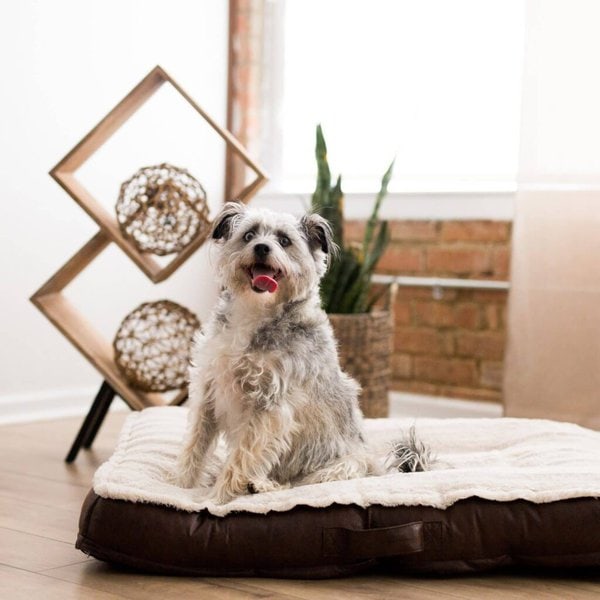
Another reason your dog could be peeing at home is due to overexcitement. And this is often accompanied by frantic movements, wriggling and excited jumps from a pooch.
On the bright side, peeing when excited is mostly common in puppies and younger dogs. And as a pooch grows older, coupled with proper training, it mostly gains the ability to control itself better.
Also, dogs may pee out of fear or as a sign of submission to someone in the home, and this often happens as the aftermath of severe scolding or punishments.
How Can I Stop My Dog From Peeing All Over The House?
Visit The Vet
The first thing to do when you notice that your dog has taken a sudden liking to pee in the house is to take it in for a comprehensive medical check and diagnosis at your vet doctor.
As stated earlier, peeing around the house can be a sign of an infection or a medical condition in your pooch. And with the appropriate treatment and medication, this behavior can be corrected.
However, if your vet rules out an infection as the cause of your dog’s inappropriate urination, you could try any of the methods listed below:
Training
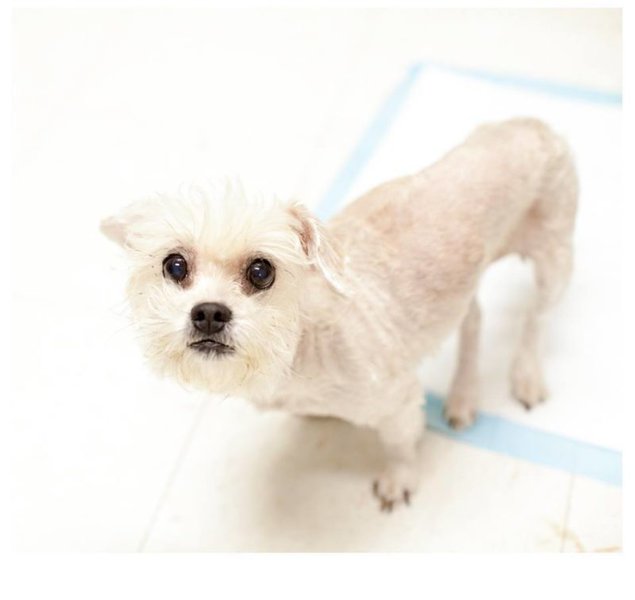
If your adult dog wasn’t properly potty-trained as a puppy, it is never too late to teach it appropriate peeing behaviors.
- Start by creating a peeing schedule for your dog and regularly leading it outdoors to pee.
- If you catch your dog peeing where it ought not to, interrupting the act will teach it not to urinate there again.
- By giving your dog treats when it pees in the right locations, you can reinforce appropriate peeing behavior in your furry friend.
- Don’t get angry when your dog relapses by peeing in the home. Instead, clean up the accident and repeat the previous training steps.
Due to the development of bad habits and a strong will over the years, it might be difficult to potty-train an adult dog. But with your patience and consistency, along with constant supervision, your pooch will learn to pee in the right places.
For a dog that was previously potty-trained, revisiting some of the old training steps can also help in curbing problems of inappropriate urination.
Consider Using Diapers
For older dogs with difficulties controlling their bladders, the use of specially-designed dog diapers can help control peeing at home. Diapers vary in size and absorption properties; hence, you should carry out proper research before choosing a product for your furry friends.
A diaper product I’d recommend for controlling inappropriate peeing behavior in your dog is the Amazon Basics Male Dog Wrap Disposable Diapers. The Amazon Basics Diapers come in a wide variety of size options and the wetness indicator can help you tell at a glance, if your dog has peed.
Additionally, using diapers on your dog requires strict supervision. Diapers need to be changed multiple times in a day to prevent infections and rashes; therefore, you should only choose this as an option if you can devote the required time and attention.
Avoid Disciplining Your Dog For Peeing In The Wrong Places
I know it can be frustrating when your dog repeatedly soils your favorite shoes, and it’s only natural if you want to let out your anger on your furry friend. However, as much as possible, you should refrain from scolding your pooch for peeing around the house.
For no reason should you yell at, starve, hit or punish a dog for peeing at inappropriate locations in the home. Doing this will only make matters worse and promote stress or aggressive behavior in your pooch.
Use Sprays
Spraying your pooch with water from a bottle when you catch it peeing in an unsuitable location will discourage it from returning to that place to pee.
Also, dogs hate the smell of citrus, ammonia, vinegar, naphthalene, and nail polish, just to mention a few. And spraying products containing these ingredients in your doggie’s favorite inappropriate peeing locations can help deter it from peeing in the house.
What Can I Spray To Keep My Dog From Peeing In The House?
As I’ve mentioned earlier, the use of certain dog-repellent sprays can come in handy in curbing issues of inappropriate elimination in your pooch.
Some of the smells dogs hate the most, plus steps to apply them in deterring your pooch from peeing in the house include:
Vinegar
Top on the list of smells that dogs hate the most is vinegar. And coupled with the fact that it is readily available in stores everywhere, vinegar is a particularly effective and popular solution to stop your dog from peeing.
To create a vinegar spray to curb your dog’s inappropriate urination:
- Mix white vinegar with apple cider vinegar in the ratio 1 to 2.
- Pour the mixture in a sprayer and apply in the areas of interest.
Dogs have a sense of smell that is, at least, 10,000 times better than ours, hence the strong smell of acetic acid contained in vinegar will prove to be too much for their noses to handle.
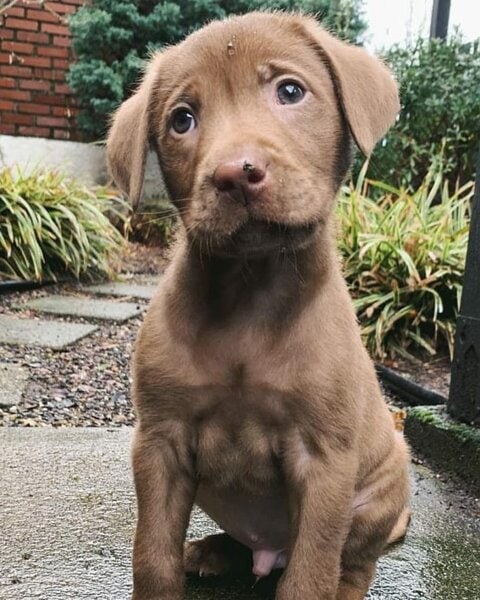
Lemon Juice
Closely behind vinegar in the list of smells dogs hate the most is the sharp, distinct smell of citruses – lemons in particular. And this is for the same reason as vinegar – the acidic smell of lemons can be overwhelming for pooches.
To create lemon spray, cut up the fruit into small sizes, and soak in water for a while. Alternatively, you can directly squeeze juice from the lemon fruit onto the desired places.
Use Of Essential Oils
Apart from vinegar and lemon, dogs also hate the smell of essential oils like cinnamon, mint and eucalyptus. And these can be useful in curbing inappropriate urination by your pooch.
Note, however, that these essential oils are typically very strong-smelling; Hence, if you don’t wish for the smell to deter both humans and dogs from the home, you should apply only a tiny drop.
Also, certain essential oils can be harmful to dogs if licked, therefore you should make sure to dilute such oils before use, and apply only minimal amounts.
Do Dogs Pee Out Of Spite?
When a previously disciplined and potty-trained doggie suddenly takes a fancy to pee on the couch or on your favorite shoes, it is only normal to think it’s doing so as a form of revenge because you yelled at it.
However, you should know that dogs do not pee out of spite – our furry friends simply don’t have it in them to hate their favorite humans.
There are several other behavioral and medical reasons dogs might take to peeing in the house, but spite or revenge are certainly not part.
That said, some other behavioral reasons your dog might pee around the home include:
Excitement
It is not uncommon for puppies to lose control of their bladders when they’re overly excited about something, which in turn, causes urine leaks all over the house. And as I’ve stated earlier, most puppies tend to outgrow this habit.
Sign Of Submission
Most dogs are hierarchical by nature, and some pooches might pee out of submission when they’re in the presence of someone they believe to be of higher rank than them. Peeing, in this context, means your pooch respects and depends on you for food and protection.
Submission peeing is mostly triggered by standing over, approaching or reaching out to a dog.
Separation Anxiety
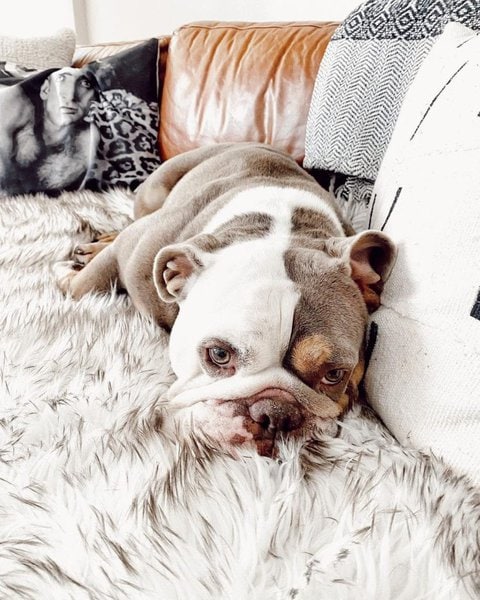
Ever arrived home from work, only to find that your dog has chewed up your furniture and sprayed urine all around the home? This destructive behavior, coupled with peeing around the home is typical with separation anxiety and is common among dogs that haven’t been trained to stay home alone.
Stress
Certain triggers such as a sudden clap of thunder, loudly banging a door or even the blender running in the kitchen can induce stress in a dog, thereby causing it to pee around the home.
Also, major changes in a dog’s immediate environment such as moving houses, the arrival of a new baby or bringing in a new pet are also things that can stress a pooch and cause inappropriate urination.
What Is The Best Way To Clean Dog Urine?
Dogs have a very keen sense of smell, and can easily sniff their urine in spots where they have previously peed. And failure to properly clean those spots will only serve as encouragement for your pooch to return to such locations to urinate.
That said, below are some of the best ways to clean up dog urine in the home:
Mop Areas Where Your Dog Has Peed
Once you notice fresh dog urine on your carpet or furniture, the first thing to do is to immediately mop up the urine with a clean towel. By doing this, you’re preventing dog urine from soaking into your furniture or rug which can make the smell even more difficult to eliminate.
Clean With A Vinegar Mixture
The smell of dog urine set in home furniture and floors made of hardwood is considerably difficult, and can’t be removed by simply mopping with a towel.
Luckily, a particularly effective way of completely getting rid of the smell of your dog’s urine on hardwood furniture is to clean accident areas with a mixture of vinegar and baking soda.
To clean your dog’s urine with a vinegar-baking soda mixture:
- Mix equal parts vinegar and the baking soda. You can get a more accurate measure of the baking soda by using the Arm & Hammer Pure Baking Soda Shaker, and you could even create this mixture in the shaker!
- Spray the mixture on areas your dog has peed on, and leave it to dry.
- You can wipe off the solution with a clean, dry towel.
Use Lemon Juice And Water
If vinegar is not available in your home, another DIY solution with which you can effectively clean dog urine is a mixture of lemon juice and water. Lemon juice is acidic in nature, thereby making it perfect for removing urine smell. And as a bonus, your home will be left with a pleasant lemon fragrance!
To clean dog urine with lemons:
- Squeeze lemon juice directly on the stain, and let it sit for a few minutes.
- Mop it off with a clean, dry towel.
Use Special Enzyme-Neutralizing Cleaners
Another way to kill the smell of dog urine in your house is by cleaning accident areas with a specially-formulated enzyme cleaner. These cleaners work by breaking down the protein-based molecules responsible for the offensive odor of dog urine.
To eliminate urine smell with an enzyme neutralizer:
- Spray the place where your dog has peed with the cleaner.
- Allow it to stay for, at least, 5 minutes.
- Thereafter, mop off the cleaner with a dry towel.
Vacuum Cleaning
Specially designed vacuum cleaners like the Bissell ProHeat 2X Revolution Max Clean Pet Pro Full-Size Carpet Cleaner are quite good at cleaning accident areas and ensuring that the smell of dog urine doesn’t linger.
The Bissell ProHeat cleaner, for instance, comes with several rotating brushes and a special urine eliminator formula designed to reach deep and get rid of embedded stains and odors. And with the vacuum’s lightweight design, cleaning your dog’s urine doesn’t have to be a difficult chore.
Related Questions
Why Is My Puppy Peeing Every 5 Minutes? Your puppy might be peeing every five minutes could be due to an infection of the urinary tract, kidney problems or diabetes. Also, puppies have smaller bladders, hence they can only hold small amounts of urine at a time. Your puppy can also pee frequently when it’s excited or due to stress and anxiety.
How Can You Tell If A Dog Has To Use The Bathroom? Older dogs needing to go use the bathroom typically display one or more of these signs:
- Increased sniffing of the floor.
- Whimpering and crying.
- Camping by the door – in some cases, this is accompanied by the dog pawing at the door.
- Moving in circles.
Puppies might not display these signs, hence you need to be more proactive and take them on regular, scheduled potty breaks.
Is Incontinence A Reason To Put A Dog Down? Incontinence in dogs can be managed and is certainly no reason to put your furry friend down. And rather than put your dog to sleep over incontinence, you can adopt the use of dog diapers for older pooches or seek medical treatment if the incontinence is as a result of an underlying health condition.

